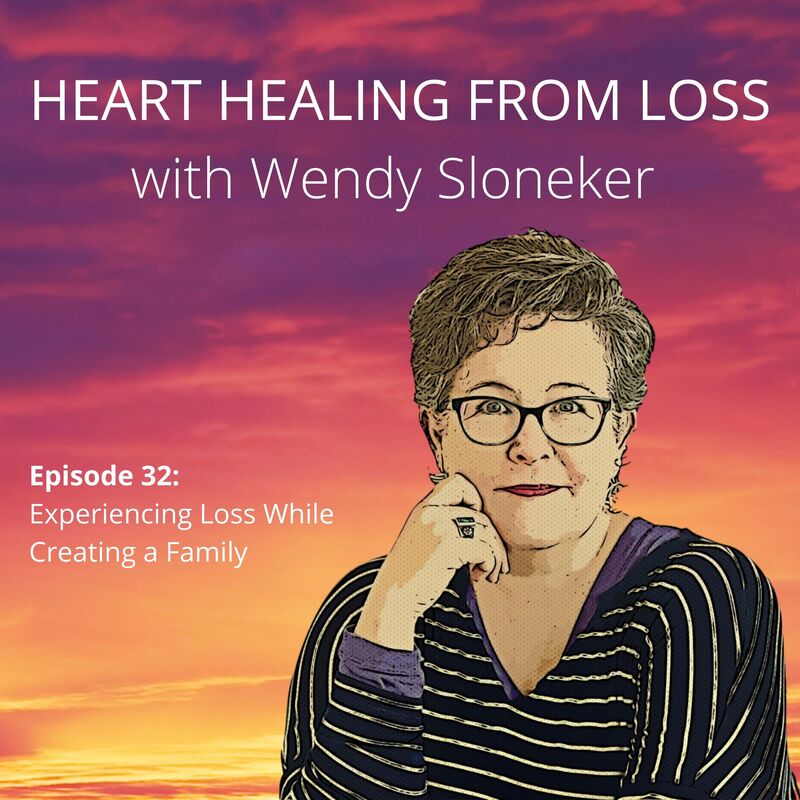Episode 32: Experiencing Grief While Creating a Family
|
Your feelings are Valid
Just as there are many different kinds of loss, there are many different definitions of "family." And though your family may not look like anyone else's, the losses you experience are valid. In this episode, Grief Coach Wendy Sloneker talks about what constitutes loss while creating a family, however you define that family. How to Count Yourself In Humans experience the full range of human feelings, and it's important to "count yourself in," when you've had an important life event. |
You are Invited:
Learn more, then visit Wendy at HeartHealingFromLoss.com to schedule your complimentary consultation.
Learn more, then visit Wendy at HeartHealingFromLoss.com to schedule your complimentary consultation.
As seen on: |
|
Full Episode Transcript
Wendy Sloneker
You are listening to the Heart Healing from Loss podcast with Wendy Sloneker, episode 32.
I'm so glad you're here, the topic is one that I've been culminating, and talking about on a different upcoming podcast project. And I want to share a few insights here with you too. It's around loss while creating a family. And this is one that I really want to take a little bit of time with this episode to talk about, to talk about what I'm talking about actually like what constitutes the creation of a family.
When I think about people who experienced loss, while creating a family, the first thing that comes to mind is often either pregnancy loss or baby loss, or perhaps even infertility, or fertility path or fertility journey. So, for me, when I started thinking even more about this, that while true, those three things do definitely constitute laws while creating a family. There's more, it goes deeper.
And so I want to expand what the range of creating a family can include. And I want to talk a little bit about it so that we, as humans, who are experiencing a full range of life experience, including 40 Plus difficult or challenging experiences that can create feelings of grief and loss, we can include ourselves in like, Yeah, I'm experiencing loss while creating a family. Instead of more often than not, what I see is in my clients, people will count themselves out rather than count themselves in in terms of claiming and experience life experience that may be painful, but can also be really enriching, like the path to parenthood or the creation of a family, whatever that looks like, can be an enriching experience, even if there's pain along the way, even if there's loss along the way.
So what I want to talk about first is, let's talk about what creating a family can include. Because these, these are often things that also may lead to feelings of grief and loss. So if this is something that resonates with you, I'm so glad. Please just try this on. And try to count yourselves in on the experience rather than simply counting yourselves out. If you haven't experienced pregnane pregnancy loss or baby loss or had an infertility or fertility path or journey that doesn't look like traditional pregnancy. I almost said organic pregnancy isn't that funny. But like what traditional pregnancy, like what we think about in terms of, you know, sex, so.
So let's talk about what creating a family may include, allow me to remind you of what grief and loss can can come from. So the general description or a definition that I use is that grief and loss those feelings can come from conflicting feelings that stem from either a halt or a change in a familiar routine or pattern. So change is rife in terms of creating a family, which can include making a commitment of some kind, whether it's marriage, or a handfasting, or a ceremony that can create a family with or without kids with or without pets. You can be a family of two or in the case of polyamorous families like that can be two or more. Three or more. However many that is agreed upon in your family construct.
Pregnancy can be a part of creating a family adoption can be part of creating a family, choosing a family or your family of friends. My beautiful buddy Aaron talked about spending time with her framily, her friends, that she's chosen as her family, her family of choice. We can also be single people and move toward creating a family with the experience of parenthood. So I'm going to include pets as well as children here so they can be your fans.
I want to affirm that your definition of family and how it gets created is exactly right for you. And so when a loss occurs, it gets to also be affirmed and counted as the unique and beautiful individual relationship that it is. Now one thing about family, as a term that I want to just also check in with is how our brains are sort of tied in with feelings of belonging, a longing for belonging, a longing for connection. We, as humans come from a long, long line over 1000s of years, around tribes, or tribe thinking or groups. Family is a type of group, a community is a larger type of group.
So it's important that for our very survival based on 1000s of years ago, because that's the brain, we still we still have a part of our brain that's wired for 1000s of years ago. Acceptance, value, worthiness, belonging and connectedness. These are really important in terms of being in and belonging to groups, or tribes, or families, it's part of how our brain helps us to stay safe. And this very aware tool that lies above our neck, our brain is often highly attuned to what is or isn't happening, just in an effort to stay, what it thinks is safe, may not actually be the case. It's no longer 1000s of years ago, we have washing machines and technology. And many of us have clothes and food and electricity in order to stay safe, stay sheltered, stay fed.
And so when it comes to creating a family and having that longing, that that desire for community and connectedness inside of a family group, or a family construct of your choosing, this is where our brains get pretty attached to outcomes, and what's going on, and how's it going to happen. And am I still safe, like emotionally safe, that's what I'm talking about here.
So just in terms of keeping it kind of general, and we'll be talking about this more and more as I go further in over time, there are complications that can bring about feelings of loss. So this can be in terms of family creation, and I am going to go into including children or animals, or pets, as a way of creating a family.
One of the things that's huge is the isolation and loneliness that can complicate and also amplify feelings of loss, feelings of grief, for the folks who are like, including pets as their family, a lot of people who are really child focus or children focused, actually don't count the pets. And so that can be an isolating or lonely time to not have support around you, that affirms that pets are part of your family.
Similarly, for those who are getting pregnant or trying to get pregnant, that sort of thing, the first few months of pregnancy if you're not sharing what's going on, I hear from I have some friends over at a reproductive medicine organization that people are still not really talking about whether or not they're pregnant the first three months just to ensure that like, hey, things are going okay, it's viable pregnancy, we're going to be able to carry to term, that sort of thing.
So that can also in those first three months when a pregnancy is involved, that can be really isolating and lonely as well. It's further amplified the isolation, loneliness and grief if a pregnancy is lost, right, so this is part of the deal. What we're grieving isn't just the loss of a pregnancy or the loss of a community around people who just don't understand or affirm that pets are part of your family that you choose. It's also the hopes, dreams and expectations of being surrounded the desire for the experience that you have in your mind your dreams, of what it is to have that new new member of your family come to being the isolation alone. Loneliness are real. And it's in grief of, of not having that experience is already painful, but to be isolated and lonely about it. It just furthers the pain experience infertility and adoption process, a donor process. And also any hormone protocol changes that may happen for those people in the trans community. These can be things that complicate feelings of loss. Right?
So what I'm really talking about here, too, is the the amount of change depending on what your experiences are. This can also lead to real changes in or even temporary changes in identity. Other types of grief that people may feel is they're sort of grieving their own childhood, they grieve the way they've been parented. Not to say that your parents weren't doing like the best they could or things like this, and slash, but perhaps you didn't receive the kind of parenting you needed in certain areas. And I don't see how any parent in any timeline at any point in the time space continuum could actually fulfill every child's needs for the way they need to be parented. I just don't know that that's humanly possible.
We also have work to do each each of us on our own. So parents can't do it all the role of parenting, or the role of being a parent is also one that is continually changing. So, you know, my mom used to give herself like an hour where she would ask us three kids to go upstairs and just deal with ourselves for an hour like don't there was nothing that we could burn ourselves with upstairs, there was nothing around that it was kind of like the sequestered naptime or quiet time, where she could just decompress, and watch Another World, like give herself a few minutes.
And I don't know that, that many parents actually feel they can do that these days, parenting has a lot of pressure going on with it. I was also brought up in a time where we spent a lot of time outside playing. And that's not really the case, these days, or these times, not right now. It's just not it's not bad, it is different. So coming to understand that the parenting or the family that you're creating, may not include or look like what it was you were brought up with either, you know, in a positive or neutral or a negative way. It's gonna be different. So what does that mean more change and navigating, how it's different navigating what that brings up inside of you emotionally that's still unresolved in terms of unprocessed emotion or unshared emotional communications.
And this is this is loss, it's uncertain. Uncertainty is another element. And for those creating a family uncertainty is really part of the whole package. No matter what kind of family you're creating, there's uncertainty. And we can go ahead and pair this, with the uncertainty in our larger world as well. It can feel very unsettling, it can feel scary, it can feel heavy. And this may be something to identify where you can learn new tools, these kinds of changes are things that foster growth. And I would say that creating a family of any kind is a growth experience for everyone. Where we get to be with ourselves, process, anything that's left from any other relationships, resolving unresolved grief, this is big change is going to continue to come and has you are moving forward in your lives.
It's important to be able to count yourself count your experience no matter what it is, in order to be really aware of where that unresolved grief may still be lingering. emotional pain is something that we can learn to process and release. Are things going to go back to the way they were not Whatever, I'm sorry, it's just not that there is no going back. The people in my life who have died, have died, they are no longer on the planet, the relationships that have ended, have really ended.
For the most part, certainly my first marriage, it has ended. Having the wherewithal to claim our experiences and be willing to process the emotional pain in order to keep the sweet stuff, good memories, the gladness, the tenderness, even some of the conflicting feelings, these are okay. You can choose whatever it is that you want to keep, you also have the wherewithal and the choice and the power to learn something new so that if something is dragging you down, or weighing you down, or doesn't feel good anymore, that you know how you can release it, you can process it, so it's not painful.
And you can have more room in your life for more of what you do want more of what you do want, including feelings of freedom, lightness, liberation, capacity, better decision making these sorts of things. The key is to be aware of what those feelings are inside, if change and the halt of a familiar pattern or routine, like having somebody around in your life. That's a familiar pattern is that my ex girlfriends were in my life pretty regularly for a while until we broke up. And then they weren't. So that was a grief that I needed to walk through. That was the same with my ex husband.
It was routine, it was regular, regular part of my life. And then the absence of dad going through a divorce, which I was not familiar with, I had never gone through one before. These are things that cause grief and the pain of loss. Going through it and never having gone through it before is a pretty big change.
And so when you're creating a family, any family, this is also new. So changes in identity can come about, you're becoming a different person while you're walking through and doing this, this thing for the first time.
So I'm hopeful that this conversation has been helpful in just in terms of helping you to think about, hey, where, where might I still have unresolved grief or feelings of loss that I can observe, and process and release. It's totally possible ask me more about this in a connection call when you're ready. It's a big deal. And so making room in your life and processing the feelings that have not yet been processed. Like they stay in our bodies, they stay in our hearts, they stay in our soft tissue, they show up as stress and other physical problems and, you know, certainly emotional pain.
So ask me about how to move through these things and count yourself in around the experiences that you've had. They've impacted you, they've changed your life. They've opened you up, you've experienced something new.
This is okay. This is part of claiming a rich life experience so that you can have a rich life experience. And also release what is no longer serving you.
Thank you for hearing me. Thank you for listening to me, thinking of you. And until next episode. Bye bye.
Hi, it's Wendy, thank you so much for listening. If something resonated or stuck out or sort of hummed with you in this episode, and you want to either talk more about it, or have me talk more about it, let's schedule a connection call. It could be that you are ready to learn how to release emotional pain. That sounds great. It's great to do and it's great on the other side. Regardless, you're invited.
So if you think it's time for a free 30 minute connection call, I would love to have that with you. Go to Wendy at hearthealingfromloss.com to email and schedule or you can text or call 206-498-8025 and schedule it that way. I would love to talk with you and I would love to listen to you too.
Thank you and thanks for coming back for the next episode too.
You are listening to the Heart Healing from Loss podcast with Wendy Sloneker, episode 32.
I'm so glad you're here, the topic is one that I've been culminating, and talking about on a different upcoming podcast project. And I want to share a few insights here with you too. It's around loss while creating a family. And this is one that I really want to take a little bit of time with this episode to talk about, to talk about what I'm talking about actually like what constitutes the creation of a family.
When I think about people who experienced loss, while creating a family, the first thing that comes to mind is often either pregnancy loss or baby loss, or perhaps even infertility, or fertility path or fertility journey. So, for me, when I started thinking even more about this, that while true, those three things do definitely constitute laws while creating a family. There's more, it goes deeper.
And so I want to expand what the range of creating a family can include. And I want to talk a little bit about it so that we, as humans, who are experiencing a full range of life experience, including 40 Plus difficult or challenging experiences that can create feelings of grief and loss, we can include ourselves in like, Yeah, I'm experiencing loss while creating a family. Instead of more often than not, what I see is in my clients, people will count themselves out rather than count themselves in in terms of claiming and experience life experience that may be painful, but can also be really enriching, like the path to parenthood or the creation of a family, whatever that looks like, can be an enriching experience, even if there's pain along the way, even if there's loss along the way.
So what I want to talk about first is, let's talk about what creating a family can include. Because these, these are often things that also may lead to feelings of grief and loss. So if this is something that resonates with you, I'm so glad. Please just try this on. And try to count yourselves in on the experience rather than simply counting yourselves out. If you haven't experienced pregnane pregnancy loss or baby loss or had an infertility or fertility path or journey that doesn't look like traditional pregnancy. I almost said organic pregnancy isn't that funny. But like what traditional pregnancy, like what we think about in terms of, you know, sex, so.
So let's talk about what creating a family may include, allow me to remind you of what grief and loss can can come from. So the general description or a definition that I use is that grief and loss those feelings can come from conflicting feelings that stem from either a halt or a change in a familiar routine or pattern. So change is rife in terms of creating a family, which can include making a commitment of some kind, whether it's marriage, or a handfasting, or a ceremony that can create a family with or without kids with or without pets. You can be a family of two or in the case of polyamorous families like that can be two or more. Three or more. However many that is agreed upon in your family construct.
Pregnancy can be a part of creating a family adoption can be part of creating a family, choosing a family or your family of friends. My beautiful buddy Aaron talked about spending time with her framily, her friends, that she's chosen as her family, her family of choice. We can also be single people and move toward creating a family with the experience of parenthood. So I'm going to include pets as well as children here so they can be your fans.
I want to affirm that your definition of family and how it gets created is exactly right for you. And so when a loss occurs, it gets to also be affirmed and counted as the unique and beautiful individual relationship that it is. Now one thing about family, as a term that I want to just also check in with is how our brains are sort of tied in with feelings of belonging, a longing for belonging, a longing for connection. We, as humans come from a long, long line over 1000s of years, around tribes, or tribe thinking or groups. Family is a type of group, a community is a larger type of group.
So it's important that for our very survival based on 1000s of years ago, because that's the brain, we still we still have a part of our brain that's wired for 1000s of years ago. Acceptance, value, worthiness, belonging and connectedness. These are really important in terms of being in and belonging to groups, or tribes, or families, it's part of how our brain helps us to stay safe. And this very aware tool that lies above our neck, our brain is often highly attuned to what is or isn't happening, just in an effort to stay, what it thinks is safe, may not actually be the case. It's no longer 1000s of years ago, we have washing machines and technology. And many of us have clothes and food and electricity in order to stay safe, stay sheltered, stay fed.
And so when it comes to creating a family and having that longing, that that desire for community and connectedness inside of a family group, or a family construct of your choosing, this is where our brains get pretty attached to outcomes, and what's going on, and how's it going to happen. And am I still safe, like emotionally safe, that's what I'm talking about here.
So just in terms of keeping it kind of general, and we'll be talking about this more and more as I go further in over time, there are complications that can bring about feelings of loss. So this can be in terms of family creation, and I am going to go into including children or animals, or pets, as a way of creating a family.
One of the things that's huge is the isolation and loneliness that can complicate and also amplify feelings of loss, feelings of grief, for the folks who are like, including pets as their family, a lot of people who are really child focus or children focused, actually don't count the pets. And so that can be an isolating or lonely time to not have support around you, that affirms that pets are part of your family.
Similarly, for those who are getting pregnant or trying to get pregnant, that sort of thing, the first few months of pregnancy if you're not sharing what's going on, I hear from I have some friends over at a reproductive medicine organization that people are still not really talking about whether or not they're pregnant the first three months just to ensure that like, hey, things are going okay, it's viable pregnancy, we're going to be able to carry to term, that sort of thing.
So that can also in those first three months when a pregnancy is involved, that can be really isolating and lonely as well. It's further amplified the isolation, loneliness and grief if a pregnancy is lost, right, so this is part of the deal. What we're grieving isn't just the loss of a pregnancy or the loss of a community around people who just don't understand or affirm that pets are part of your family that you choose. It's also the hopes, dreams and expectations of being surrounded the desire for the experience that you have in your mind your dreams, of what it is to have that new new member of your family come to being the isolation alone. Loneliness are real. And it's in grief of, of not having that experience is already painful, but to be isolated and lonely about it. It just furthers the pain experience infertility and adoption process, a donor process. And also any hormone protocol changes that may happen for those people in the trans community. These can be things that complicate feelings of loss. Right?
So what I'm really talking about here, too, is the the amount of change depending on what your experiences are. This can also lead to real changes in or even temporary changes in identity. Other types of grief that people may feel is they're sort of grieving their own childhood, they grieve the way they've been parented. Not to say that your parents weren't doing like the best they could or things like this, and slash, but perhaps you didn't receive the kind of parenting you needed in certain areas. And I don't see how any parent in any timeline at any point in the time space continuum could actually fulfill every child's needs for the way they need to be parented. I just don't know that that's humanly possible.
We also have work to do each each of us on our own. So parents can't do it all the role of parenting, or the role of being a parent is also one that is continually changing. So, you know, my mom used to give herself like an hour where she would ask us three kids to go upstairs and just deal with ourselves for an hour like don't there was nothing that we could burn ourselves with upstairs, there was nothing around that it was kind of like the sequestered naptime or quiet time, where she could just decompress, and watch Another World, like give herself a few minutes.
And I don't know that, that many parents actually feel they can do that these days, parenting has a lot of pressure going on with it. I was also brought up in a time where we spent a lot of time outside playing. And that's not really the case, these days, or these times, not right now. It's just not it's not bad, it is different. So coming to understand that the parenting or the family that you're creating, may not include or look like what it was you were brought up with either, you know, in a positive or neutral or a negative way. It's gonna be different. So what does that mean more change and navigating, how it's different navigating what that brings up inside of you emotionally that's still unresolved in terms of unprocessed emotion or unshared emotional communications.
And this is this is loss, it's uncertain. Uncertainty is another element. And for those creating a family uncertainty is really part of the whole package. No matter what kind of family you're creating, there's uncertainty. And we can go ahead and pair this, with the uncertainty in our larger world as well. It can feel very unsettling, it can feel scary, it can feel heavy. And this may be something to identify where you can learn new tools, these kinds of changes are things that foster growth. And I would say that creating a family of any kind is a growth experience for everyone. Where we get to be with ourselves, process, anything that's left from any other relationships, resolving unresolved grief, this is big change is going to continue to come and has you are moving forward in your lives.
It's important to be able to count yourself count your experience no matter what it is, in order to be really aware of where that unresolved grief may still be lingering. emotional pain is something that we can learn to process and release. Are things going to go back to the way they were not Whatever, I'm sorry, it's just not that there is no going back. The people in my life who have died, have died, they are no longer on the planet, the relationships that have ended, have really ended.
For the most part, certainly my first marriage, it has ended. Having the wherewithal to claim our experiences and be willing to process the emotional pain in order to keep the sweet stuff, good memories, the gladness, the tenderness, even some of the conflicting feelings, these are okay. You can choose whatever it is that you want to keep, you also have the wherewithal and the choice and the power to learn something new so that if something is dragging you down, or weighing you down, or doesn't feel good anymore, that you know how you can release it, you can process it, so it's not painful.
And you can have more room in your life for more of what you do want more of what you do want, including feelings of freedom, lightness, liberation, capacity, better decision making these sorts of things. The key is to be aware of what those feelings are inside, if change and the halt of a familiar pattern or routine, like having somebody around in your life. That's a familiar pattern is that my ex girlfriends were in my life pretty regularly for a while until we broke up. And then they weren't. So that was a grief that I needed to walk through. That was the same with my ex husband.
It was routine, it was regular, regular part of my life. And then the absence of dad going through a divorce, which I was not familiar with, I had never gone through one before. These are things that cause grief and the pain of loss. Going through it and never having gone through it before is a pretty big change.
And so when you're creating a family, any family, this is also new. So changes in identity can come about, you're becoming a different person while you're walking through and doing this, this thing for the first time.
So I'm hopeful that this conversation has been helpful in just in terms of helping you to think about, hey, where, where might I still have unresolved grief or feelings of loss that I can observe, and process and release. It's totally possible ask me more about this in a connection call when you're ready. It's a big deal. And so making room in your life and processing the feelings that have not yet been processed. Like they stay in our bodies, they stay in our hearts, they stay in our soft tissue, they show up as stress and other physical problems and, you know, certainly emotional pain.
So ask me about how to move through these things and count yourself in around the experiences that you've had. They've impacted you, they've changed your life. They've opened you up, you've experienced something new.
This is okay. This is part of claiming a rich life experience so that you can have a rich life experience. And also release what is no longer serving you.
Thank you for hearing me. Thank you for listening to me, thinking of you. And until next episode. Bye bye.
Hi, it's Wendy, thank you so much for listening. If something resonated or stuck out or sort of hummed with you in this episode, and you want to either talk more about it, or have me talk more about it, let's schedule a connection call. It could be that you are ready to learn how to release emotional pain. That sounds great. It's great to do and it's great on the other side. Regardless, you're invited.
So if you think it's time for a free 30 minute connection call, I would love to have that with you. Go to Wendy at hearthealingfromloss.com to email and schedule or you can text or call 206-498-8025 and schedule it that way. I would love to talk with you and I would love to listen to you too.
Thank you and thanks for coming back for the next episode too.






